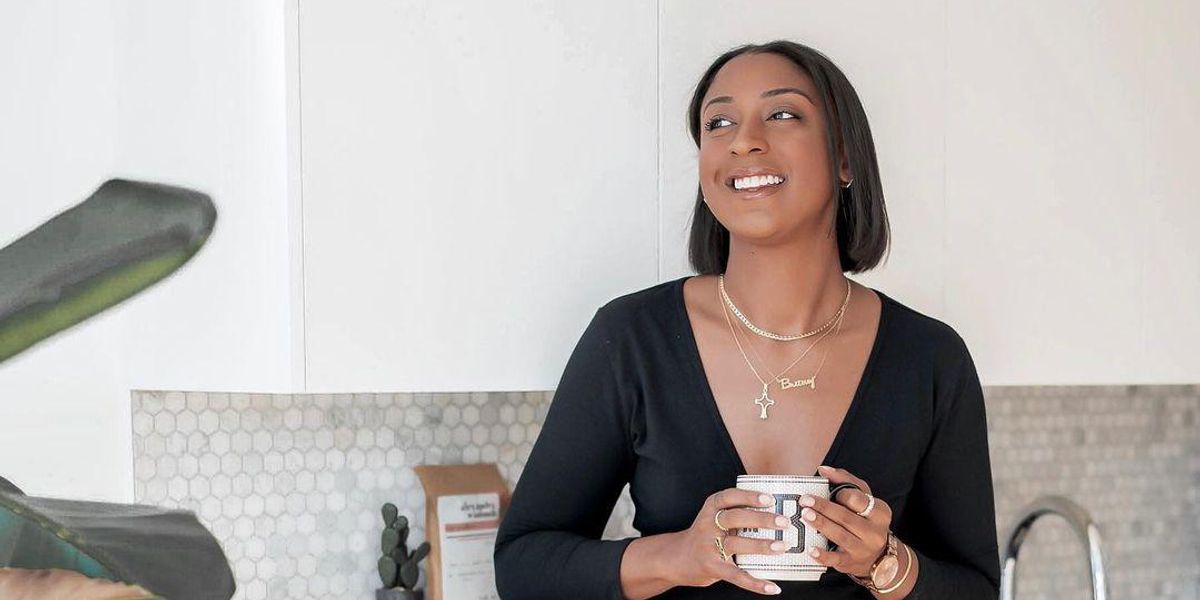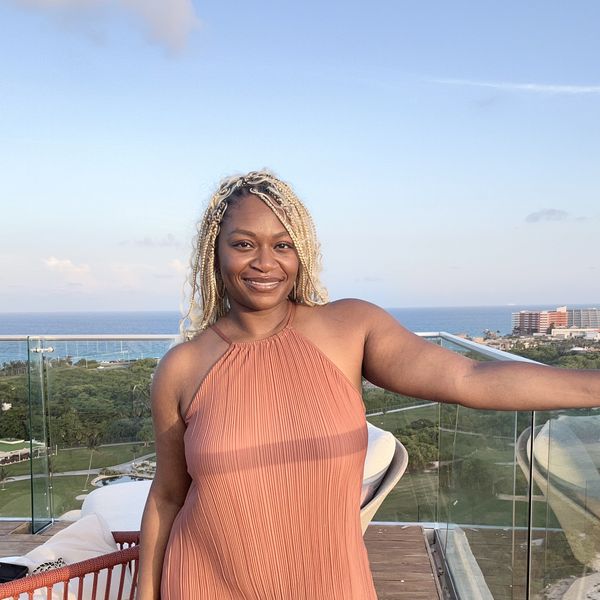
Women Of Color On The Weight Of The Generational Curses They Carry
Women have been programmed for generations to look, act, speak, heal and not heal a certain way. Sadly, most of this has been passed down from the women in our families growing up. Our mothers, grandmothers, and aunts sometimes projected traditional beliefs or acted in ways we didn't always agree with. Continuing to love them, but consciously knowing the pain behind their lessons and actions.
I grew up in a household where both my mother and father worked. My father was bringing in most of the money and covering the bills from his mechanic business. My mother was working for minimum wage and providing her children with what they needed. As their marriage began to strain, so did the finances. My father (the breadwinner) eventually left home and started a new life. At the same time, my mother held the financial responsibility. As the bills began to pile, so did her stress. Food was now minimal, and cable was a privilege. One day, it all became too much. My mother grabbed me in frustration and said, "Don't you ever rely on a man!"
The pain in her eyes still haunts me to this day.
As an adult, I have struggled with financial roles in relationships. I find myself cringing when a man wants to pay for date night, cover living expenses, or even buy me a cup of coffee. The idea of a partner providing financial security is frightening. I know this fear comes from my childhood experience. I carry the narrative of being a strong independent woman because of the pain my mother endured. I'm learning through therapy that it's OK to be a strong independent woman and be cared for by your partner. A common factor many women of color struggle with today.
I believe I am the woman I am today because of my mom. I have inherited so much (both good and bad) from watching her as a little girl. As I learned this about myself, I began to wonder if other women felt the same way. Here are a few women on their experience with generational curses.
Khristina Williams

Courtesy of Khristina Williams
"As a little girl watching other women in my life, my experience was seeing women who constantly put others before themselves. The women I saw growing up were independent and strong. My mother always sacrificed so that my siblings and I could have a better life. My mother constantly worked, so we spent most of our time with my grandmothers and sitters. I have some strong women in my family, but the man was the head of the household.
"My great-grandmother, Ernestine, was a nurturer. Growing up, I observed her taking care of my great-grandfather, a former WWII vet. They stayed in separate rooms due to him being ill. Her entire day revolved around taking care of her husband until his demise. All of the women in my family leaned on one another in good and bad times.
"In terms of gender roles, the women in my family defied those expectations."
"The women (my mom's generation) were able to pursue careers. However, my grandmothers and great-grandmothers were housewives. So, it's interesting to see the changes through generations. Gender expression and gender roles are societal constructs. I was never raised to feel I couldn't do something because of my gender. My family has always encouraged me to be the best version of myself and do what I want to do."
For more of Khristina, follow her on Instagram.
Anisa Benitez

Courtesy of Anisa Benitez
"I don't believe in 'curses', but there are infidelity patterns and scarcity in my family. I grew up around others who felt and expressed a lack of prosperity, time, money, and love in their lives. Meanwhile, they weren't expressing appreciation for the abundance in their present moment; for example, gratitude for good health, the love of friends, and the money to always make ends meet somehow.
"In regards to breaking a scarcity mindset, I've learned that the present moment is abundant. Our clinging to the past or fixation on the future is the root of most suffering. When we can enjoy where we are and all we have, the more good opportunities we see in the present."
"Loving myself has been healing. I practice living mindfully and mind my thoughts most of all. 'What is the story I am telling myself?' is a common question I ask myself. I go to therapy, meditate, take care of my body, eat well, sleep, practice creative wellness, make time to laugh, enjoy this life, and take holistic care of my health. I make more love-based decisions than fear-based. It's a better time to be ourselves openly. It means more room to self-express, heal, liberate yourself and others."
"Women in my family are compelling and nurturing. However, taking on caregiving roles left them with little bandwidth to care for themselves. They didn't know how to enjoy their alone time. We need to normalize breakthroughs. It would be great to see enough women of color liberated, successful, and being themselves. This way of living shouldn't be considered a 'breakthrough'."
For more of Anisa, follow her on Instagram.
Britney Turner

Courtesy of Britney Turner
"When it came to my mom, I observed something that I would rarely see on TV shows and movies at that time--a woman who was knowledgeable in finances and accounting. You always heard that men handled the finances and were the breadwinners, and women just didn't ask questions. Seeing her crunch numbers and budget gave me a different outlook on financial literacy and its accessibility to women. Not only did I learn about financial literacy from her, but I also observed the way she carried herself.
"In the media, women are often sexualized and exploited for their bodies - but I'm thankful that my mother and grandmothers rooted us in the church and taught us the importance of respecting yourself and demanding respect as a woman. Watching their mannerisms and how they were vocal about their needs helped set the tone of how I would present myself in the workplace, friendships, and relationships.
"As a little girl, watching the women in my life was a great experience. I took away so many different perspectives from each of them about being a woman, and more importantly, being a black woman."
"We still have so much work to do, but seeing the women I admire live life unapologetically and speak their minds is such a liberating feeling. Seeing women of color embrace their skin, natural hair, and features without shrinking themselves has made me want to cry. I think back to being in elementary school and feeling like straight hair was more 'appropriate' or more 'professional'. I remember being scared to embody what it means to be a black woman fully. Generational curses sometimes come from the stigma and stereotypes that society has placed on us as well."
For more of Britney, follow her on Instagram.
Featured image courtesy of Britney Nicole
This article is sponsored by Hulu.
UnPrisonedhas returned for its highly anticipated second season, delving deeper into the complex dynamics of the Alexander family.
The series premiere comes a year after its debut season garnered rave reviews from fans and critics and earned record-breaking ratings for Hulu's Onyx Collective brand. UnPrisoned's success can be attributed to its raw, relatable themes and comedic appeal.
Inspired by creator Tracy McMillan's life, the show follows Paige (Kerry Washington), a therapist and single mother whose life takes an unexpected turn when her father, Edwin (Delroy Lindo) --who was released from prison-- moves in with her and her teenage son, Finn (Faly Rakotohavana).
Throughout UnPrisoned's first season, viewers witnessed how Edwin's incarceration deeply affected Paige's life and relationships. In the series, Paige unpacks her trauma through interactions with her inner child and her online followers. Meanwhile, Edwin is overcoming specific struggles with his own past that led to his life of crime, including a dysfunctional upbringing and his mother's arrest. As the Alexanders attempt to reconcile, new challenges arise.
This new season promises to further explore their unconventional family dynamic. Here are several compelling reasons why season two of UnPrisoned should be on everyone's watchlist.
The Alexander Family Life Is Still In Shambles
UnPrisoned's second season resumes where the series left off, with Paige grappling with the fallout from her troubled therapy practice and Edwin navigating life independently after moving out. Meanwhile, Finn faces his own challenges. The teenager is battling anxiety and seeking information about his father—a topic Paige avoids discussing.
The Alexander Family Are Attending Therapy To Resolve Their Underlying Issues
Amid the chaos in their lives, the Alexander family decides to mend their bond by confronting their past traumas. They seek professional help and attend therapy sessions with a “family radical healing coach,” played by John Stamos, a new cast member. This collective effort aims to unravel the complexities of their shared history and strengthen their relationships.
The process of unraveling each character's internal conflicts and their potential impact on future relationships may clash with Paige's textbook therapy approach. While Paige is used to being in the therapist's seat in both career and family, this forces her into the unfamiliar role of a patient during therapy sessions. This shift would compel her to look in the mirror and try a radically different approach.
The Alexander Family Learned A Big Lesson During A Therapy Session
In therapy, the Alexanders are tasked with addressing their individual traumas to salvage their remaining relationships. One of the family therapist’s eccentric suggestions was an exercise involving a family wrestling match. During this session, Paige faces tough questions about her refusal to share information about Finn's father.
While it's unclear whether this scene is reality or fantasy, the image of the family duking it out in the ring certainly makes for hilarious yet compelling television.
Paige Tries Dating Again Following Failed Relationships
Amid her life's chaos, Paige decides to step back into the dating field. However, her many attempts have left her with mixed results. The dating apps have turned out to be a fail, and an outing with her ex Mal (Marque Richardson), who is also her father's parole officer, doesn’t go quite as expected after he brings an unexpected guest – his new girlfriend.
The situation takes an awkward turn when Mal's new partner learns why the former couple split, partly due to Paige's self-sabotage.
UnPrisoned Is A Perfect Balance Of Comedy And Drama
As a dramedy, UnPrisoned takes a comedic approach to its heavy subjects. The show takes us on a ride with Paige's dating misadventures and navigating a friendship with her ex.
Other lighthearted moments include Edwin's attempts at CPR based on online videos and, of course, the antics of the Alexander family's unconventional new healing coach.
The second season of UnPrisoned is now available on Hulu.
UnPrisoned | Season 2 Trailer | Hulu
Feature image courtesy
Blair Underwood Initially Turned Down 'Sex And The City' Because 'It Was About How Samantha Was Fascinated By Dating A Black Man’
Actor and heartthrob Blair Underwood is opening up about why he turned down Sex and the City the first time he was offered a role. Many fans of the HBO series may recall Blair's time on the show in which his character was dating Miranda (Cynthia Nixon). However, he was previously offered another role where his character would date Samantha (Kim Cattrall).
During his interview with AV Club, the Set It Off star revealed that he was uncomfortable with the initial offer due to the character's fascination with him being a Black man.
“I actually did say ‘no’ the first time,” he said. “The first time they had offered the role, to be honest with you, it was about how Samantha was fascinated by dating a Black man and wanted to know if, uh, all of the rumors were true about our anatomy! And I said, ‘Listen, I’m honored, thank you, but I just don’t want to play a character based on race, on curiosity about a Black man.'”
But that didn't stop them from reaching out again. This time he was offered to play Dr. Robert Leeds, the love interest to Miranda and he decided to go for it. "So they were nice enough to call about a year later, and I said, 'Well, is it gonna be about race?' And they said, 'No, no, no, we’re not even gonna mention race!' And I think it really did only come up maybe once," he recalled.
"It did five episodes, and I think Samantha mentioned it once, saying something about 'a Black doctor' that Miranda was dating. And that’s really been a consistent thing in my career: not wanting to be boxed as 'the Black guy.'
"I’ve had that conversation with many producers along the way, and they were so great. They said, 'No, he’s just a doctor who Miranda meets in the elevator, and they have a nice little fling.' And it was amazing."
Blair has had a wide-ranging career playing everything from a lawyer on L.A. Law to playing Madame CJ Walker's husband on Self Made: Inspired by the Life of Madame CJ Walker. And during his interview, he revealed another role that he initially turned down, Set It Off. The movie, which is considered a classic in Black culture, stars Queen Latifah, Jada Pinkett Smith, Vivica A. Fox, and Kimberly Elise. Blair's character, Keith, played a banker and love interest to Jada's character, Stony.
He explained why he said no at first and eventually accepted the offer. "I had initially said “no” to that. Because I was playing this historic, iconic African-American historical figure in Jackie Robinson, and the time, y’know, there was Boyz N The Hood, and Menace II Society was out there, and I’d finished playing this noble Negro… [Laughs]," he said.
"And I’m reading the script, and there’s a scene where Jada Pinkett’s character—Jada Pinkett-Smith now—was going to sell her body so she could make some money to send her brother to college. And I remember, honestly, I threw the script across the room. I was, like, “I don’t want to do this. I want to do something uplifting for the Black culture and Black characters, and I don’t know if I want to see this.”
After a conversation with the movie's director F. Gary Gray and the actor's manager encouraging him to finish reading the script, Blair had a change of heart. What he first thought about the movie turned out to be totally different.
"So I finished the script, and I saw that the character they were asking me to play was really the love story in the midst of all of this turmoil of all of these characters, the four ladies: Queen Latifah, Vivica Fox, Kimberly Elise, and Jada," he explained.
"It was so well-written, it was such a great platform for them. And to be able to play the love story and the storyline that gave Jada’s character a leg up and a way out of this world, something to hope for, to wish for, someone to love her… I said, 'You know what? I’d like to be a part of that.'
"And I’m so glad I did, because that film resonates to this day. People all the time come up to me and say that they love that movie. So I’m glad that I did it."









